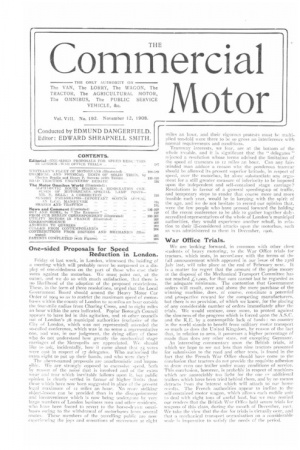One-sided Proposals for Speed Reduction in London.
Page 1

If you've noticed an error in this article please click here to report it so we can fix it.
Friday ol last week, in London, witnessed the holding of a meeting which will probably never be surpassed as a display of one-sidedness on the part of those who cast their votes against the motorbus. We must point out, at the outset, and we do so with much satisfaction, that there is no likelihood of the adoption of the proposed restrictions. These, in the form of three resolutions, urged that the Local Government Board should amend the Heavy Motor Car Order of 190.1. so as to restrict the maximum speed of motorbuses within the county of London to 10 niiles no hour outside the four-mile radius from Charing Cross, and to eight miles an hour within the area indicated. Poplar Borough Council appears to have led in this agitation, and r6 other councils out of I .ondon 's 28 municipal authorities (exclusive of the City of London, which was not represented) attended the so-called conference, which was in no sense a representative one, and was, in our judgment, the dying effort of those who do not understand how greatly the miiechaiical stage carriages of the Metropolis are appreciated. Wr should like to ask, incidentally, how it came about that 2s votes were cast in respect of 17 delegates. Who aut:lorised the extra eight to put up their hands, and who were they? The tlreve-named proposals are anachronistic and imposible. We are strongly opposed to excessive ,peed, both by renson of the noise that is involved and ol the extra wear and tour which inevitably follows upon it, but public opinion is clearly settled in favour of higher lirrits than those which have now been suggested in place of the present kUalIfiaximmil of 12 miles an hour. No more strikinc. object-lesson can be provided than in the disaapointment and inconvenience which is now being tmdereame by very large numbers of London business men and other residents. who have been forced to revert to the horse-drawn omnibuses owing to the withdrawal of motorbuses from several routes. These members of the travelling public are now exuerieneing he joys and sensations of mcven1( at at eight
201 202 202 204 miles an hour, and their vigorous protests must be multiplied ten-fold were there to be so gross an interference with normal requirements and conditions.
• Tramway interests, we fear, are at the bottom of the whole trouble, and it is significant that the " delegates " rejected a resolution whose terms advised the limitation of
he speed of tramcars to 12 miles an hour. Can any fair187 minded man adduce a reason why the ponderous tramcar should be allowed its present superior latitude, in respect of speed, over the motorbus, let alone substantiate any argatmein: for a still greater measure of inferiority to be imposed upon the independent and setf-comained stage carriage? Resolutions in favour of a general speeding-up of traffic, and temporary steps to render that course more and more feasible each year, would he in keeping with the spirit of the age, and we do not hesitate to record our opinion that, were the few people who have pressed forward the holding of the recent conference to be able to gather together dulyaccredited representatives of the whole of Landon's municipal' authorities, they would experience another rebuff, in relation to their ill-considered attacks upon the motorbus, such as was administered to them in December, too6.
War Office Trials.
We are looking forward, in common with other close. students of heavy motoring, to the l-Var Office trials for tractors, which tests, in accordance with the terms of the full announcement which appeared in our issue of the 23rd .1tily last, will take place at the end of February next. It is a matter for regret that the amount of the prize money at the disposal of the Mechanical Transport Committee has not reached j, 1,000. for that sum cannot but be regarded as the adequate minimum. The contention that Government orders will result, over and above the mere purchase of the winning machine, does, of course, constitute a potential and prospective reward for the competing manufacturers, but there is no provision, of which we know, for the placing of any considerable number of orders immediately after the trials. We would venture, once more, to protest against the slowness of the progress which is forced upon the A.S.C. and the RE. by a contemptible lack of funds ; no country in the world stands to benefit from military motor transport so much as does the United Kingdom, by reason of the fact that, in relation to area, it possesses a higher percentage of roads than does any other state, not excepting Germany. An interesting commentarv upon the British trials, at which we hope to see not less than nine tractors presented for submission to the road and other tests, is found in the fact that the French War Office should have come to the conclusion that tractors do not provide the requisite adhesion to draw even one trailer under many conditions of service. This conclusion, however, is probably in respect of machines which are appreciably too lie-ht for the one Sr additional trailers which have been tried behind them, and by no means detracts from the interest which will attach to our borne resells. The French authorities appear to incline to the self-contained motor wagon, which allows each mobile unit in deal with eight tons of useful load, but we max remind our readers that the British War Office held severe 'trials kr wagons of this class, during the month of December, 1001. We take the view that the -clav for trials is virtually over, and that a mechanical transport ortzanisation on a ronsiderahle. scale is imperative to satisfy the needs of the period.






















